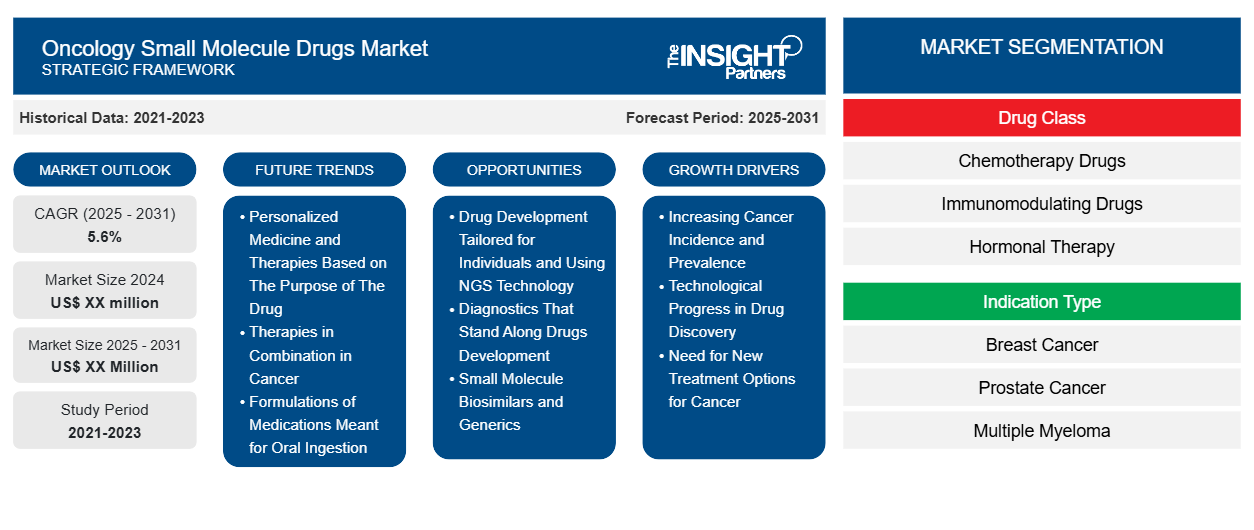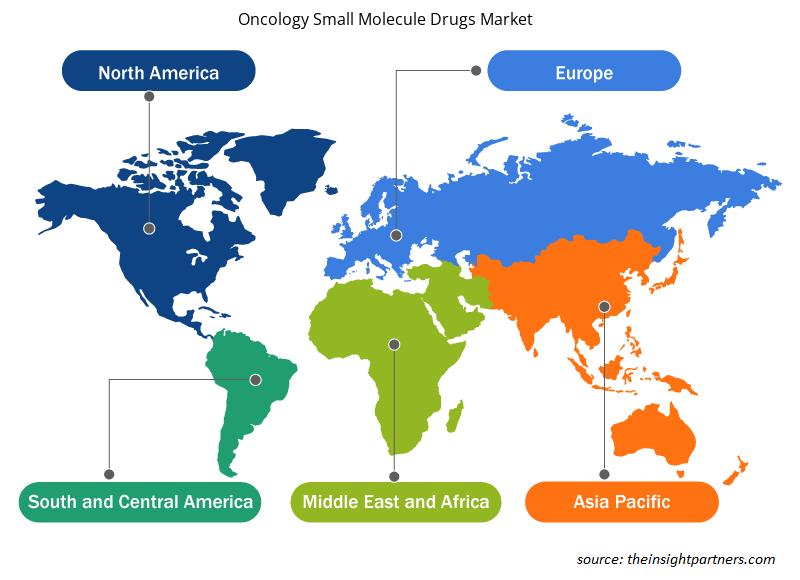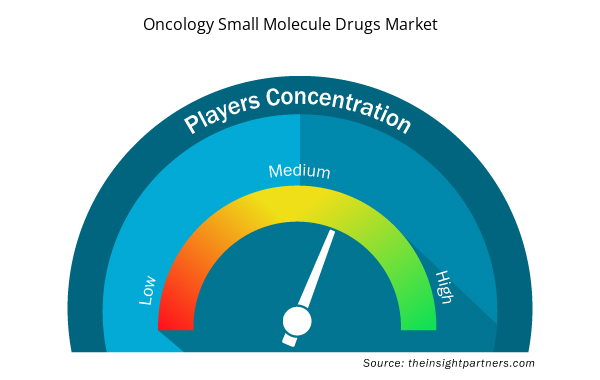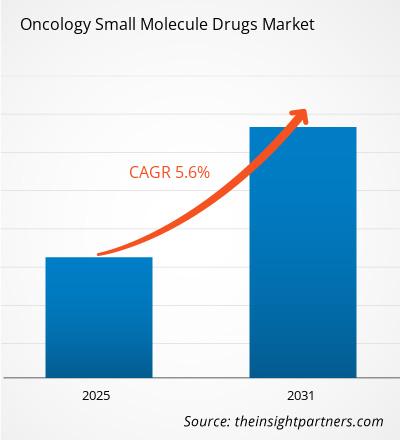The Oncology Small Molecule Drugs Market is expected to register a CAGR of 5.6% from 2025 to 2031, with a market size expanding from US$ XX million in 2024 to US$ XX Million by 2031.
The report is segmented by Drug Class (Chemotherapy Drugs, Immunomodulating Drugs, Hormonal Therapy, Targeted Therapy Drugs). The report is segmented by Indication Type (Breast Cancer, Prostate Cancer, Multiple Myeloma, Melanoma, Lymphoma, Leukemia, Non-small Cell Lung Cancer (NSCLC), Renal Cell Carcinoma, Others). The report is segmented by Route of Administration (Oral, Injectable). The report is segmented by Distribution Channel (Hospital Pharmacies, Retail Pharmacies, Specialty Clinics, Online Pharmacies). The global analysis is further broken-down at regional level and major countries. The Report Offers the Value in USD for the above analysis and segments.
Purpose of the Report
The report Oncology Small Molecule Drugs Market by The Insight Partners aims to describe the present landscape and future growth, top driving factors, challenges, and opportunities. This will provide insights to various business stakeholders, such as:
- Technology Providers/Manufacturers: To understand the evolving market dynamics and know the potential growth opportunities, enabling them to make informed strategic decisions.
- Investors: To conduct a comprehensive trend analysis regarding the market growth rate, market financial projections, and opportunities that exist across the value chain.
- Regulatory bodies: To regulate policies and police activities in the market with the aim of minimizing abuse, preserving investor trust and confidence, and upholding the integrity and stability of the market.
Oncology Small Molecule Drugs Market Segmentation
Drug Class
- Chemotherapy Drugs
- Immunomodulating Drugs
- Hormonal Therapy
- Targeted Therapy Drugs
Indication Type
- Breast Cancer
- Prostate Cancer
- Multiple Myeloma
- Melanoma
- Lymphoma
- Leukemia
- Non-small Cell Lung Cancer
- Renal Cell Carcinoma
- Others
Route of Administration
- Oral
- Injectable
Distribution Channel
- Hospital Pharmacies
- Retail Pharmacies
- Specialty Clinics
- Online Pharmacies
Customize This Report To Suit Your Requirement
You will get customization on any report - free of charge - including parts of this report, or country-level analysis, Excel Data pack, as well as avail great offers and discounts for start-ups & universities
Oncology Small Molecule Drugs Market: Strategic Insights

- Get Top Key Market Trends of this report.This FREE sample will include data analysis, ranging from market trends to estimates and forecasts.
Oncology Small Molecule Drugs Market Growth Drivers
- Increasing Cancer Incidence and Prevalence: Cancer is increasingly expected to drive the market for oncology small molecule drugs over the forecast period. The World Health Organization had predicted that nearly 10 million individuals will die due to cancer and other related diseases in 2020, making it the second most common cause of death across the globe. As the world’s population ages and its habits become more sedentary, the number of new cancer cases diagnosed within a certain timeframe is expected to increase hence the need for better treatment strategies. Although it has its limitations, small molecule drugs are an alternative method that is effective and cheaper to the problem caused by the increasing cases of cancer.
- Technological Progress in Drug Discovery: Drug discovery technologies continuously improving is another factor propelling the growth of oncology small molecule market. The emergence of technologies such as high-throughput screening, artificial intelligence (AI) in drug design, and next-generation sequencing (NGS) has completely changed the processes for discovering new molecular targets and developing potent and selective drugs. An emphasis on intervention, especially in these settings with regard to pathways in the cell which extend the lifespan of the tumor, has its directed therapies in evidence and has made treatment sorts more tolerable.
- Need for New Treatment Options for Cancer: There has been numerous improvement in the treatment of cancers, however, there are several cancers that are still challenging to treat and/or control. Chemotherapy and similar standard approaches tend to have pronounced toxicity and low effectiveness. In an effort to develop new methods of battling cancer at the most fundamental levels and avoid the devastating side effects of existing treatments, the market for oncology small molecule drugs continues to grow. Therapies directed against mutations, against the function certain proteins perform or the pathways they inhabit are regarded as a major step forward from traditional treatment.
Oncology Small Molecule Drugs Market Future Trends
- Personalized Medicine and Therapies Based on The Purpose of The Drug: The evolution of the small oncology therapeutics market has been characterized with the most notable focus on the tendencies towards personalization of treatment which has been regarded as precision medicine in this case. The changes in genomes and discovery of biomarkers has now made it possible to come up with drugs that will consider the genetic mutations or molecular abnormalities existing in tumors. This minimizes any toxicity caused by therapeutic interventions as anthracyclines cancer treatment is focused more on the individual patient’s specific situation. This includes the rise of various therapies based on the mechanism of action of drugs such as tyrosine kinase inhibitors and proteasome inhibitors as well as immune modulators.
- Therapies in Combination in Cancer: There is a growing acceptance of combining small molecule drugs with other treatments in particular immunotherapy or radiation therapy in oncology. Introduced agents are capable of overcoming tumor progression resistance by acting on different mechanisms of action of tumor growth or overcoming drug resistance. For instance, the use of small targeted molecules together with immune checkpoint inhibitors can be used in a way that mobilizes the immune response towards more effective cancer cell destruction. This pattern is contributing to the more integrative way of dealing with cancer.
- Formulations of Medications Meant for Oral Ingestion: In oncology, the use of oral formulations of small molecule drugs is on the rise due to the fact that they are more convenient to the patients. Oral formulations result to avoiding intravenous administration, thus reducing the number of hospital visits associated with cancer treatment thus enhancing the quality of life of cancer suffering individuals. Oral chemotherapy has numerous advantages as seen in the introduction of drugs such as imatinib (Gleevec) and ibrutinib (Imbruvica) into the market and this trend is expected to rise as numerous small molecules are in the pipeline in oral dosage forms.
Oncology Small Molecule Drugs Market Opportunities
- Drug Development Tailored for Individuals and Using NGS Technology: Advances in medicine from the standpoint of personalization come forth as a boon in the oncology small molecules market. With It allows for better insight into cancer genomics and molecular changes. Targeted small molecules, designed according to individual genetic traits, may soon be developed. The language of medicine has reached a stage where drugs can be prescribed targeting specific mutations/biomarkers in a tumor mass of a patient which more likely than not would cause a very positive response from the patient.
- Diagnostics That Stand Along Drugs Development: In Cancer In treatment of cancer, the use of biomarkers is initiating the need for companion diagnostics. The use of small molecule therapeutics in conjunction with specific biomarkers will enable the physician to determine the subset of patients who will achieve the greatest benefit from that treatment. Companion diagnostics are used to align patients with suitable therapies thereby enhancing treatment strategies and minimizing the trial and error methods. The risk that has been lowered is appealing to drug developers and diagnostics producers.
- Small Molecule Biosimilars and Generics: As it has been noticed that the patents of many successful oncology small molecule drugs are overdue, the availability of biosimilars and generics is expected to increase further within the market. These alternatives will help address the growing global burden of cancer treatment costs. Biosimilars of popular oncology drugs, including trastuzumab and rituximab, can ensure more critical therapies are available to patients at cheaper rates than ever: especially in low and middle: income countries.
Oncology Small Molecule Drugs Market Regional Insights
The regional trends and factors influencing the Oncology Small Molecule Drugs Market throughout the forecast period have been thoroughly explained by the analysts at Insight Partners. This section also discusses Oncology Small Molecule Drugs Market segments and geography across North America, Europe, Asia Pacific, Middle East and Africa, and South and Central America.

- Get the Regional Specific Data for Oncology Small Molecule Drugs Market
Oncology Small Molecule Drugs Market Report Scope
| Report Attribute | Details |
|---|---|
| Market size in 2024 | US$ XX million |
| Market Size by 2031 | US$ XX Million |
| Global CAGR (2025 - 2031) | 5.6% |
| Historical Data | 2021-2023 |
| Forecast period | 2025-2031 |
| Segments Covered |
By Drug Class
|
| Regions and Countries Covered | North America
|
| Market leaders and key company profiles |
Oncology Small Molecule Drugs Market Players Density: Understanding Its Impact on Business Dynamics
The Oncology Small Molecule Drugs Market market is growing rapidly, driven by increasing end-user demand due to factors such as evolving consumer preferences, technological advancements, and greater awareness of the product's benefits. As demand rises, businesses are expanding their offerings, innovating to meet consumer needs, and capitalizing on emerging trends, which further fuels market growth.
Market players density refers to the distribution of firms or companies operating within a particular market or industry. It indicates how many competitors (market players) are present in a given market space relative to its size or total market value.
Major Companies operating in the Oncology Small Molecule Drugs Market are:
- Johnson & Johnson
- Boehringer Ingelheim
- Pfizer
- Merck
- GlaxoSmithkline
Disclaimer: The companies listed above are not ranked in any particular order.

- Get the Oncology Small Molecule Drugs Market top key players overview
Key Selling Points
- Comprehensive Coverage: The report comprehensively covers the analysis of products, services, types, and end users of the Oncology Small Molecule Drugs Market, providing a holistic landscape.
- Expert Analysis: The report is compiled based on the in-depth understanding of industry experts and analysts.
- Up-to-date Information: The report assures business relevance due to its coverage of recent information and data trends.
- Customization Options: This report can be customized to cater to specific client requirements and suit the business strategies aptly.
The research report on the Oncology Small Molecule Drugs Market can, therefore, help spearhead the trail of decoding and understanding the industry scenario and growth prospects. Although there can be a few valid concerns, the overall benefits of this report tend to outweigh the disadvantages.
- Historical Analysis (2 Years), Base Year, Forecast (7 Years) with CAGR
- PEST and SWOT Analysis
- Market Size Value / Volume - Global, Regional, Country
- Industry and Competitive Landscape
- Excel Dataset


- Sodium Bicarbonate Market
- Aerospace Forging Market
- Transdermal Drug Delivery System Market
- Ceramic Injection Molding Market
- Surgical Gowns Market
- Space Situational Awareness (SSA) Market
- Bio-Based Ethylene Market
- Medical Collagen Market
- Quantitative Structure-Activity Relationship (QSAR) Market
- Wind Turbine Composites Market

Report Coverage
Revenue forecast, Company Analysis, Industry landscape, Growth factors, and Trends

Segment Covered
This text is related
to segments covered.

Regional Scope
North America, Europe, Asia Pacific, Middle East & Africa, South & Central America

Country Scope
This text is related
to country scope.
Frequently Asked Questions
The Oncology Small Molecule Drugs Market is estimated to witness a CAGR of 5.6% from 202#to 2031
The major factors driving the Oncology Small Molecule Drugs market are:
1. Increasing Cancer Incidence and Prevalence
2. Technological Progress in Drug Discovery
Drug Development Tailored for Individuals and Using NGS Technology act as a opportunity for growth of the market in forecast period.
North America region dominated the Oncology Small Molecule Drugs market in 2023.
Players operating in the market are Johnson & Johnson, Boehringer Ingelheim, Pfizer, Merck, GlaxoSmithkline, Gilead Sciences, Teva Pharmaceutical, Allergan, Bristol- Myers Squibb, AstraZeneca
Oncology Small Molecule Drugs segment, by drug class, dominated the market in 2023.
Trends and growth analysis reports related to Life Sciences : READ MORE..
1. Johnson & Johnson
2. Boehringer Ingelheim
3. Pfizer
4. Merck
5. GlaxoSmithkline
6. Gilead Sciences
7. Teva Pharmaceutical
8. Allergan
9. Bristol- Myers Squibb
10. AstraZeneca.

 Get Free Sample For
Get Free Sample For